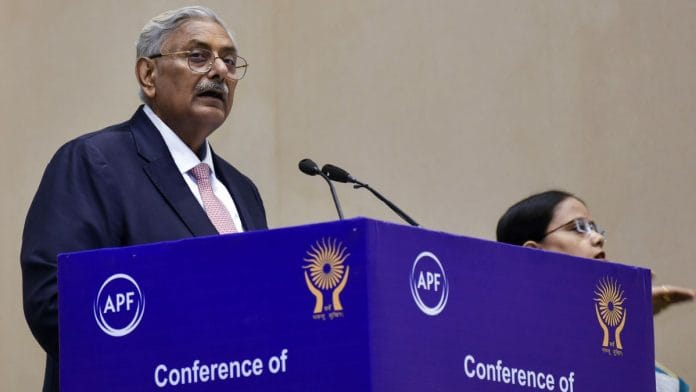New Delhi: A leading international body on human rights — Global Alliance of National Human Rights Institutions (GANHRI) — has deferred the accreditation of India’s National Human Rights Commission (NHRC) for the second year in a row, official sources confirmed to ThePrint. This hasn’t come as a surprise to human rights defenders in India, including one former NHRC employee, who say that they have witnessed the gradual deterioration of the body over the years.
They cite the Protection of Human Rights (Amendment) Bill in 2019 as a turning point, which saw former Supreme Court judge, Arun Kumar Mishra, who has publicly praised Prime Minister Narendra Modi as a “visionary” in the past, become the NHRC’s chairperson in 2021.
“This is not a surprise as there have been multiple gaps in functioning and capacities in the NHRC for years,” Maja Daruwala, the organisation’s former special monitor, told ThePrint. “There should be no question of the National Human Rights Commission of a country, of our international stature, being assessed as anything other than first-class, but clearly the GANHRI is signaling that it is not up to the mark. This is a matter of deep concern,” she added.
Official sources told ThePrint that bodies like GANHRI are “left-leaning Western institutions”. While human rights activists have questioned the NHRC’s “silence” with respect to the release of the gangrape convicts of Bilkis Bano in 2022 — who subsequently surrendered earlier this year — and other issues in the past, the sources argued that the body has taken initiative in certain cases, such as the West Bengal panchayat elections last July, where almost 30 people died in violence.
The Sub Committee on Accreditation (SCA) under GANHRI is expected to go public with its decision on NHRC’s accreditation in the first week of June. A change in accreditation can be challenged within 28 days of the date of communication of the recommendation, according to Article 12.1 of GANHRI Statute.
Geneva-based GANHRI gives either ‘A’ or ‘B’ status to state-run human rights institutes across the world. Withdrawal or suspension of ‘A’ status can affect a country’s ability to vote at the UN Human Rights Council and some other UN General Assembly bodies.
A Northeast India-based human rights activist, who did not wish to be named, noted the “gradual deterioration” of NHRC over the last decade. “The NHRC has enjoyed ‘A’ status for many years, but this is not the reality on ground. If they do not challenge GANHRI’s decision on accreditation, they may be trying to send a message that they no longer recognise such international bodies as having a say on India’s matters as it relates to human rights,” the activist told ThePrint.
A former NHRC employee, who worked for the body for over 20 years, told ThePrint: “The deterioration of the NHRC, whether lack of transparency or lack of diversity, began in the first term of the Modi government. This became worse with the amendment [to the Protection of Human Rights Act] in 2019. Also, the problem is the lack of trained and experience staff who mostly work on contract-basis.”
India’s NHRC has long enjoyed ‘A’ status, except in 2016, when a decision on its accreditation was deferred. Speaking to ThePrint, Henri Tiphagne, founder and executive director of human rights NGO People’s Watch, asserted that human rights activists in India have long been demanding an “upgraded” NHRC that sets an example for the other 160-odd rights organisations in the country.
“GANHRI deferred accreditation to NHRC for the first time in 2016. This would’ve happened again in 2017, but the NHRC allegedly resolved this by saying it would not look good as the body was celebrating its 25th anniversary that year,” Tiphagne told ThePrint.
ThePrint attempted to verify this claim with official sources, who declined to confirm nor deny.
(Edited by Mannat Chugh)
Also Read: ‘Win-win deal’: India, Iran sign 10 year contract for Chabahar Port amid Gaza war







So called human right bodies are controlled more like mafia organizations.
Individual building blocks of India’s global standing and stature. Each such input should be taken seriously.